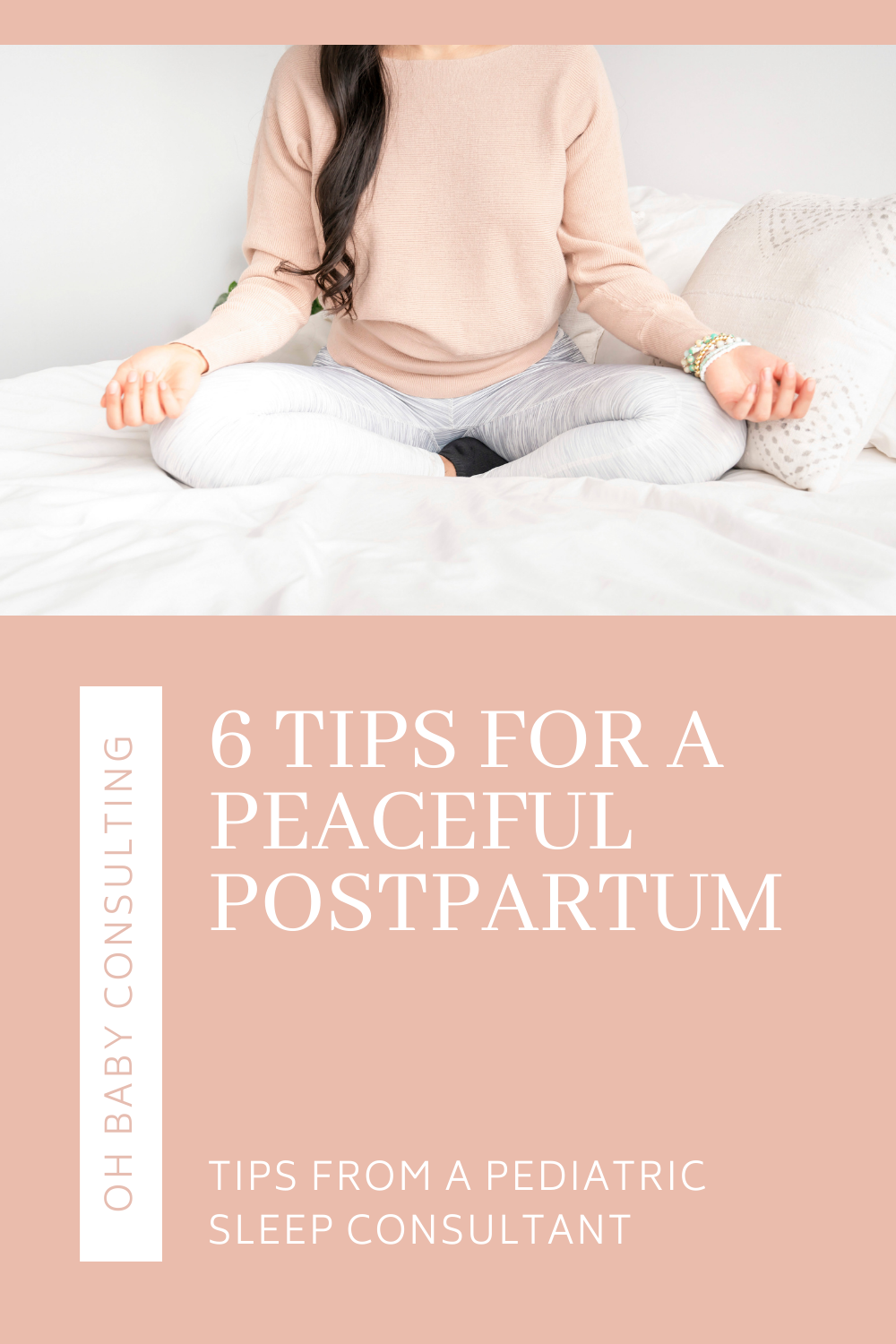6 Tips for a Peaceful Postpartum
This blog post is guest authored by Alexa Bloom. Alexa is an Arizona native turned Minnesotan, currently residing in Denver, Colorado. She lives with her husband, sister, baby Asher (9mo), and two pups. Before becoming a full-time mama, Alexa held multiple leadership positions at two of the fastest growing companies in the world. She has been practicing yoga for most of her life and has taught both adults + kids yoga over the years. In her free time you can find Alexa traveling, hiking, and enjoying life on the lake with friends & family.
We spend so much time planning for labor & delivery, decorating the nursery, and setting ourselves up for life with a newborn, oftentimes an important piece gets missed in our preparation efforts: postpartum recovery.
If you’ve just recently given birth, congratulations and welcome to the most awe-inspiring (and possibly least glamorous) club in town! If you’re reading this before having your baby, applaud yourself for wanting to cultivate a smooth transition upon baby’s arrival.
Just like most things, there is a wide range of postpartum experiences, and social media certainly doesn’t help us see ‘the real deal’ these days. Whether your birth story was totally seamless or quite the opposite; whether this is your first or third child; whether you need 8 hours of sleep per night or operate well on 5; I think everyone can agree that for many reasons, the postpartum period (aka the fourth trimester) is challenging.
There are several factors that can make this chapter especially difficult, such as: caesarean surgery recovery, sleep deprivation, postpartum hormonal changes, anxiety, depression, baby blues, lack of support, colic, breastfeeding challenges, balancing childcare for siblings simultaneously, and so much more.
Some of this is par for the course, and some of it we can actually attempt to prepare for. I have friends who totally thrived in the first several weeks & months, and many of them attribute it to taking the time to set up their home, support network, and most importantly: their expectations & mentality.
I’ve reflected on what I learned from my own personal experience, which came with many of the challenges mentioned above. Here’s what I want every new mama to know in order to feel as calm and confident as possible once they bring their baby home. Although we have no way to control when and how baby arrives, it is absolutely possible to have an intentional, peaceful, and present postpartum experience.
1. Prepare your postpartum recovery & healing supplies
First and foremost, your body just did the most amazing and arduous thing it may have ever done. It’s now time to heal. This comprehensive list covers the things you’ll want to have on hand as soon as you get home from the hospital to support your physical recovery. I recommend creating a basket with these items ahead of time for your bathroom or nightstand – your future self will thank you big time.
2. Take care of YOU
While caring for your newborn will likely be the only thing you can think about, it cannot be stressed enough how important it is to take care of yourself during this time. This means resting, relaxing, and sleeping whenever possible; eating nutritious snacks and meals; and prioritizing your health & hygiene. I wish someone would have tattooed my hand with a daily reminder to shower, brush my teeth & hair, and change out of the clothes I slept in. The simplest things can make you feel like a million bucks.
When the days and nights blend together, these three things will feel like game changers:
- Shower or take a bath every day
- Do one thing a day for just you
- Find time for daily exercise + fresh air (this can be a simple 30 minute walk around the block)
3. Set up your support system
This may be one of the most important pieces to consider in the fourth trimester. Support can show up in many forms, and embracing one or all of these will make a huge difference in your recovery and general wellness.
Create a shared vision with your partner: Ideally ahead of time, discuss things like: Do you plan to take turns waking up in the middle of the night? How will you share household and baby-specific responsibilities? What will make you feel most supported? How will you make time to bond as a couple?
Example: My husband wanted to make breakfast & coffee for me every morning. He enjoyed cooking and pretending to be a barista, and it made me feel cared for while I fed our little babe. We also decided to designate shifts throughout the night so we could each have a stretch of time to sleep. Do whatever works for you and your family – creating a plan together is what matters most.
Family, friends, neighbors: Your crew will be so excited for you and will want to support, but they may not know exactly what is needed. So, when people say “can I come see the baby?” or “can I bring anything over?” this is a great opportunity to accept help.
Some example responses you could give:
- Absolutely. I would be so grateful if you could stop by [insert your favorite coffee shop or take out spot] on your way over.
- We’d love to see you and we’ve been swamped with ______. If you’re up for it we could use an extra set of hands!
- Great! I’m going to go into the other room to lie down and close my eyes while you hold the baby for a little while.
House cleaning, pet sitting, childcare: You’ve probably already checked these boxes for the time you’ll spend in the hospital, but how about after you’ve brought baby home? Setting up care for your other kids/fur babies or your home ahead of time is an enormous assistance in the weeks after birth, and could significantly reduce the mental load that comes with motherhood, especially in the beginning.
Meal & grocery delivery: We all know how daunting meal planning can feel even when we have the time and energy. Once you bring your little one home it will probably be the last thing on your mind. If you have someone in your circle who loves to cook, enroll them in your plan and see if they’d like to contribute. My father-in-law enjoys cooking and dropped off several dishes that we could freeze or eat for multiple mealtimes (i.e. lasagna, chili, soups, baked goods) which helped immensely. I also recommend taking advantage of local grocery & restaurant delivery and meal services for optimal convenience.
4. Remember fed is best
Making sure you are well fed and hydrated is equally as important as feeding baby. To help myself feel organized and set up for success, I created a basket of feeding-related supplies that I could transport from the main living space to the nursery or my bedroom. That way my focus could be on bonding with baby as we found our rhythm in the brand new world of feeding.
This could look like:
– A storage caddy with a nursing bra, nipple shields, snacks, and hot/cold gel packs
– A basket with pumping accessories, your hands-free bra, and a new book or magazine
– A bin with formula, water bottle, a mixer, and bottles on hand
Remember, how you feed your baby is your decision – no one else’s advice or opinions matter. You get to decide what is best for both of you.
5. Prioritize mental health
Looking back I wish I would have educated myself more in this realm. Admittedly I knew very little about the hormones associated with birth and breastfeeding, Postpartum Anxiety, Postpartum Depression, and knowing what resources were available to me.
According to research from the Cleveland Clinic, as many as 50 – 75% of new mothers experience the “baby blues” after delivery, and up to 15% of these women will develop a more severe and longer-lasting depression.
Personally, I experienced mood swings, irritability, sensory overload, and anxieties that had not existed before. Since giving birth, I’ve started therapy, participated in workshops specifically for new mothers, listened to podcasts and read a lot on this vast topic.
Other incredibly helpful resources that I love to share and highly recommend:
- Dr. Sterling’s Prepared Postpartum Course
- These Books and Podcasts recommended by Dr. Cassidy Freitas
- Ted Talk: A New Way To Think About The Transition to Motherhood
- Joining a new mom’s group or class
- Virtual Therapy (Talkspace, BetterHelp, and Sesh)
6. Don’t snooze on finding sleep support
Last but not least, sleep may be the most important piece of postpartum, and chances are it will be the number one thing on your mind. It goes without saying that the newborn cuddles and naps on your chest are a slice of heaven (soak them all up!). But real talk, we are not our best selves when we haven’t slept. This Newborn Sleep Guide helped us set up healthy sleep hygiene + habits for baby which made things much more seamless as he got older. My LO started sleeping through the night by 4 months and Jamie’s coaching had everything to do with it. Take it from one previously sleep-deprived mama, these resources are a giant step toward feeling more human & an even more amazing parent than you already are.
One thing is certain: the time spent after giving birth will surely bring a range of emotions. Those dang hormones will bring on ALL the feels. Whether you want the newborn bliss to last forever or not, we must remember this too shall pass – postpartum is a short chapter in our motherhood journey. Rest assured you will get into a routine, you will sleep again, and you will watch your child grow and amaze you. Above all else, don’t forget to thank your body and admire yourself for all that you have done to bring a perfect little human into the world. Cheers to being strong as a mother.
If you’re exhausted, totally overwhelmed by your child’s sleep habits, or looking for answers to the sleep questions that keep you up at night (literally), then you’ve come to the right place. I’m Jamie, founder of Oh Baby Consulting, and my goal is to help your family get the sleep you need to not just survive, but thrive!

